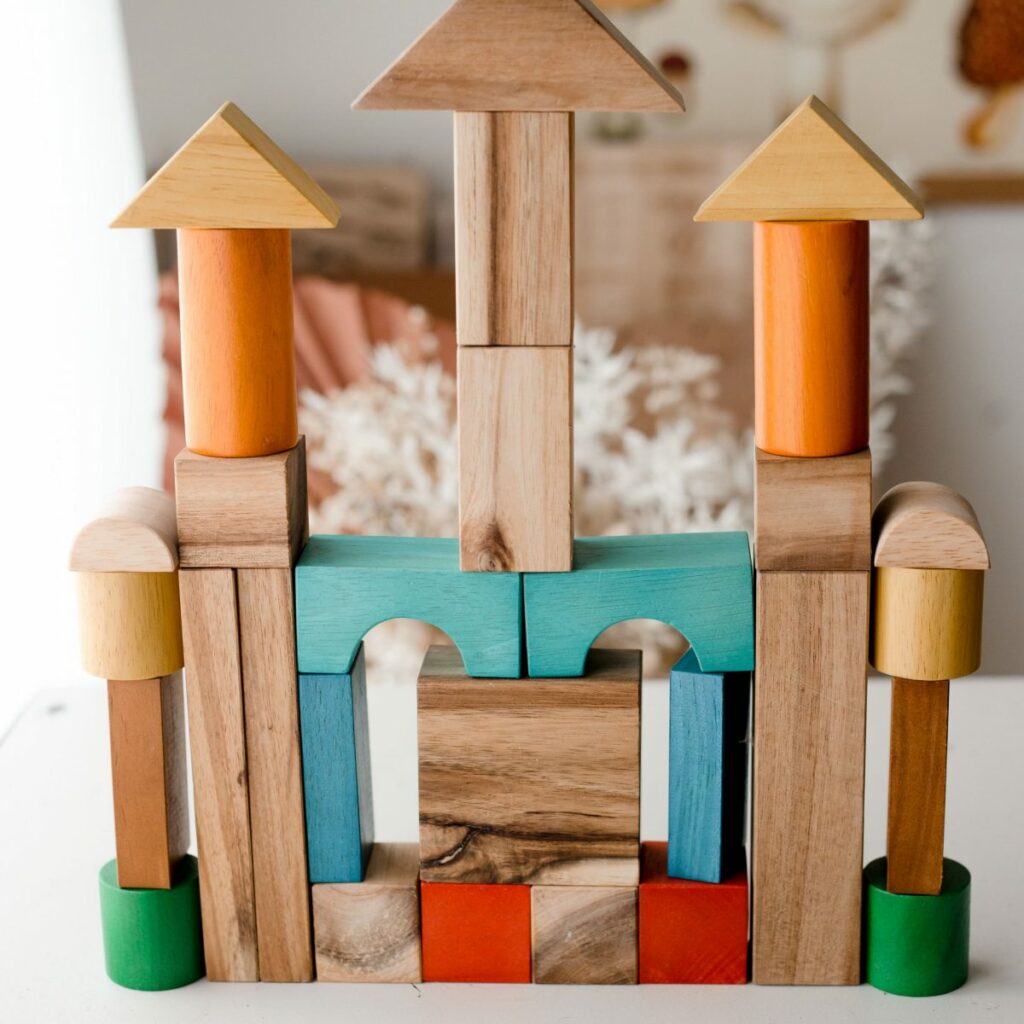In our modern society, we tend to cram-pack our kids’ schedules: school, after-school clubs, cultural outings, and activities at home. I imagine that most of us want to raise happy, fulfilled, resilient, creative kids who are eager to learn, right? 😉 What if I told you that one of the most important things we can offer our kids is the space they need to engage in “free play”?
You may think this is too easy, but allowing children time for free, unstructured play is essential for the development of their motor skills and intellectual capacities. 🙂
But… Why is it so important?
In this article, we will cover :
- What free play is
- 6 Benefits of Free Play
- How to encourage free play
- What supplies and materials to use
What is free play?
Before we dive into the benefits of free play, let’s first define what it is. Just like the name suggests, “free play” is unstructured, self-directed play that allows children to explore, discover, and create on their own. Free play allows your children to decide for themselves how they want to play.
It’s a time for children to use their imagination, try out new ideas, and interact with their environment and peers in a more open-ended way.
Free play can take many forms, such as playing with dolls, building with blocks, creating with modeling clay, playing sports, or simply running around and exploring the outdoors. It’s important to note that free play should be child-led and not directed by an adult. This allows children to make their own decisions, solve problems, and learn at their own pace.
When it comes to the supplies they will need … the simpler the better! It’s better to go for simple yet versatile materials that can be creatively adapted to many different games and scenarios.
Unlike more structured activities, when it comes to free play, the outcome, or “winning and losing” is not important. What really counts is letting creativity flow. Modeling clay and building blocks are perfect examples.

Why Is Free Play So Important?
We live in a fast-paced world. As parents, we tend to cram as much as we can into our days and watch over our kids’ activities to be sure they never get bored or “miss out” on anything.
But we have been forgetting one essential point: our little ones are born with innate curiosity… a profound desire to learn and, INCREDIBLE imagination.
Left to their own devices and with just a few simple supplies, it will shock us grown-ups how fast our children can make huge developmental leaps. 😉
So let’s explore some of the many benefits it has for children.
6 good reasons to embrace free play
Here are 6 reasons why free play is so important for your children.
1. Stimulate independence and autonomy
Kids are actually scientists at heart! They love getting stuck into all kinds of experiments.
They actually have a natural capacity to observe and explore. Testing out ideas for themselves is one of their favorite hobbies!
Unstructured play gives them the opportunity they need for free and independent exploration.
The bonus? By encouraging this type of activity, your child will be less dependent on you and will learn to make his or her own choices.
Too many organized activities risk limiting a child’s ability to motivate themselves – Kim John Payne
2. Develop children’s problem-solving skills
Free play is one of the best educational tools: it offers a stress-free environment in which children can take risks and make a ton of discoveries.
During childhood, the fear of making a mistake is one of the main obstacles to learning (a fear that can follow us all the way into adulthood, right! 😉).
When engaging in unstructured play, your child can explore his or her environment without fearing failure. When they come across problems or barriers, they learn how to find solutions for themselves. They also discover that everyone is allowed to make mistakes. And that making mistakes actually help us learn!
When children are able to make their own decisions and solve problems on their own, they feel a sense of accomplishment and pride. This can help to boost their self-confidence and self-esteem, which are important for their overall well-being.
3. Improve self-confidence
Your child explores, tries out new things, and makes discoveries. Through these new experiences, they engage their 5 senses: sight, touch, hearing, taste, and smell.
Free play gives your child the opportunity to explore autonomously without fearing mistakes or judgment and encourages your child to make their own choices and decisions and to find the necessary solutions.
All in all, it allows them to assert themselves, build their own convictions and develop their self confidence.
4. Develop creativity and imagination
During free play, children can draw on their imagination to use the same object in many different ways. The absence of rules offers your child a great level of freedom; through this, they can develop their imagination and creativity.
A piece of wood can become a sword, a hut, or even train tracks… A piece of cloth can be a superhero’s cape, a quilt for their dolls, a dress, or a tent.
Building games like Lego or wooden blocks, paints, or modeling clay are also great additions to free play. They can be used in an infinite number of ways to build and create.
And once their masterpiece is finished, you can only imagine how proud your kiddo will be when you hear them yell at the top of their voice: “You see, mom/dad, I made that all by myself!”
5. Aid concentration
Every child is curious by nature. So we should harness that curiosity! When children have an opportunity to play and explore unsupervised in a safe environment, they show that they have incredible concentration skills.
That’s why it is so important to allow your child to choose their activities spontaneously. By responding to their internal motivations and instincts, they channel their energy and focus on an activity that naturally consumes all their energy.

6. Deal with boredom
During their free time, children will have the opportunity to experience boredom.
Yes, it might seem strange to you but boredom is a very important and formative notion for children!
This allows your kids to be more tuned into what they really want and encourages them to initiate an activity for themselves. To overcome monotony, children draw from the available resources and engage their imagination.
In fact, we might assume that when a child is doing nothing, they are bored and risk becoming impatient. And yet, the reality is quite different. Don’t forget that free play encourages observation. So even though it may seem like your child is doing nothing, they are actually absorbing all the information coming from their surroundings.
Being free to steer their own activities means that your child will have more time to focus on the smaller details.
4 essential things to encourage free play?
Now that we’ve explored the many benefits of free play and you’ve understood how important it is to engage in unstructured play as much as possible, you might be wondering how you can encourage it in your own home or community.
Here are some essential things to encourage free play:
1. Provide a Safe and Stimulating Environment
It’s important to provide children with a safe and stimulating environment in which to play. This can include providing plenty of open-ended materials for children to explore and use their imagination, as well as ensuring that the play area is free from hazards.
Simple materials offer an endless number of possibilities for creative and curious children. If you are not sure which type of materials to choose, I’ll give you some ideas later on in this article.😉
2. Schedule free time
Yes, it is important to actually give children time and space to play. Free time is essential to allow your kids to make use of the material and their toys at their own pace and as they see fit.
In order for your child to want to launch their own activity, avoid cramming too many activities into their schedules and give them some time to “get bored”.
Let me reassure you, if you give them just a couple of supplies, they won’t sit around doing anything for too long! 😉
3. Don’t over-structure play or get involved in all their activities
While it’s important to provide children with some guidance and structure, it’s important to allow them to have some freedom and autonomy during play. Give your child the space they need to think about the various possibilities and to jump into action, without your help or intervention.
Let them lead the way and explore on their own.
4. Encourage Outdoor Play
Outdoor play is an important part of free play and has many benefits for children.
It is a great opportunity for children to get in contact with nature and provide children with a rich sensory experience. It gives them the opportunity to explore and discover plants, animals, and natural environments. They are exposed to a wide range of sights, sounds, smells, and textures that can stimulate their senses and provide a sense of wonder and curiosity.
Outdoor free play can also provide children with an opportunity to engage in physical activities that can stimulate their senses. For example, climbing a tree or playing in the sand can provide children with a sense of touch and movement, while running and jumping can provide a sense of balance and spatial awareness.

5. Reduce screen time
Eliminating screens means more time spent playing and it encourages this type of exploration and free play.
What types of supplies and toys encourage free play?
Here are some examples of supplies :
Modeling clay: A timeless classic! Children love creating new things and playing with modeling clay !
Building blocks: There are a thousand different ways to play with building blocks, making them the ideal tool to encourage free play, led by the children themselves.
Reused materials: Boxes, cardboard tubes, empty bottles… Your kids can build things, break them, stack them, put things inside them, create characters, trains, animals…
Anything from nature: Sticks, leaves, little rocks, flowers, grass, snow…
Play sand: Ahhhh, the sandbox! There are so many possible activities and opportunities for creativity. For indoor play, kinetic sand is a good alternative.
Small vehicles, characters, animals: Kids can create their own amazing worlds with these kinds of toys (with adorable dialogue! 😉)
Water: Most kids LOVE exploring with water and it’s an easy way to encourage free play.
Creative supplies: Paper, glue, pens, pencils, paint, feathers, glitter (urgh!!). These are all things that encourage precious playtime.
Musical Instruments: With musical instruments, kids can explore different sounds and rhythms. It’s a great way to encourage sensory discovery, creativity, coordination, and motor skills!

The take-home message
As parents, we sometimes worry that our children are bored or that they might ‘miss out’ on something.
But, actually, they need to experience boredom! Because this is for them the best way to learn how to take initiative and make decisions.
Free play encourages :
- exploration
- imagination
- creativity
- independence
- autonomy
- problem-solving
Our little ones are born with innate curiosity, a deep-rooted desire to learn, and INCREDIBLE imagination skills.
So, let’s trust their natural capabilities and let our kids play unsupervised 😉
What about you, what is your kids’ favorite activity? Let me know in the comments! 😉






